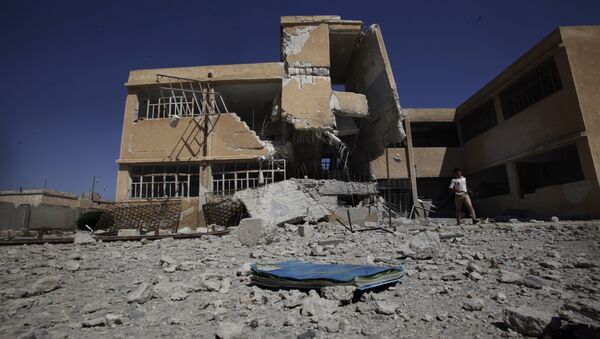WASHINGTON (Sputnik) – On Monday, US Secretary of State John Kerry and Russian Foreign Minister Sergei Lavrov announced that a ceasefire agreement had been struck between the Syrian government and a host of rebel groups, to take effect on February 27.
Turkey and Saudi Arabia probably resent the way Russia and the United States shut down their ambitions to topple President Bashar Assad and likely still have designs to escalate the conflict, Institute for Gulf Affairs analyst Adam Whitcomb told Sputnik on Monday.
"Turkey and Saudi Arabia have been communicating about the potential of placing ground forces within Syria, only to be resolutely shut down by Russia," Whitcomb said. "The sentiment of escalation still remains, as both countries perceive themselves to be surrounded completely by enemies."
Whitcomb noted that the United States and Russia stepped in to impose their new joint agreement after they failed to bring Saudi Arabia, Turkey and other countries into agreement in the International Syria Support Group (ISSG).
"The failure to meet the deadline from this past Friday resulted in the United States and Russia having to officially take control and co-chair the negotiations with ISSG members. The most recent assault on Aleppo confirmed to both sides the necessity for an end to the conflict," he added.
The international community needed to pay attention to the general upholding of the cessation agreement and how other regional ISSG members react in terms of escalation or de-escalation, Whitcomb said.
American Kurdish Information Network Director Kani Xulam told Sputnik that the Cessation of Hostilities agreement reached is good news for Kurds, for friends of peace, and for friends of Syria.
Kurds had long asked for a special status within Syria and the new US-Russian agreement had the potential to give them an opportunity to make their case, Xulam said.
"President [Vladimir] Putin of Russia has praised Kurds as tough fighters and the United States government, in spite of Turkish objections, has not pulled a Kissingerian trick on them," he added.
The agreement would have a better chance of success if it puts the Syrian side of the Turkish border in the hands of Kurds, Syrian government forces or their partner, Russians, Xulam suggested.
"The foreign fighters who have used Turkey as a way station must be served a notice that their path is permanently blocked," Xulam added.
According to the agreement, the Syrian army, its allies, Russia and the US-led international coalition will continue launching airstrikes against terrorist groups.




